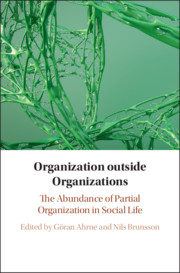Book contents
- Organization outside Organizations
- Organization outside Organizations
- Copyright page
- Contents
- Preface
- Contributors
- Introduction
- Part 1 Rules, Sanctions, Membership
- Part 2 Organization in and around Markets
- Part 3 Networks and Other Social Relationships
- 9 The Inter-Firm Network as Partial Organization?
- 10 An Organized Network: World Economic Forum and the Partial Organizing of Global Agendas
- 11 Organizing Intimacy
- 12 How Is ‘Organized Crime’ Organized?
- 13 Brotherhood as an Organized Social Relationship
- Part 4 Social Movements and Collective Action
- Part 5 The Partial Organization of Formal Organizations
- Conclusion
- Index
- References
10 - An Organized Network: World Economic Forum and the Partial Organizing of Global Agendas
from Part 3 - Networks and Other Social Relationships
Published online by Cambridge University Press: 11 July 2019
- Organization outside Organizations
- Organization outside Organizations
- Copyright page
- Contents
- Preface
- Contributors
- Introduction
- Part 1 Rules, Sanctions, Membership
- Part 2 Organization in and around Markets
- Part 3 Networks and Other Social Relationships
- 9 The Inter-Firm Network as Partial Organization?
- 10 An Organized Network: World Economic Forum and the Partial Organizing of Global Agendas
- 11 Organizing Intimacy
- 12 How Is ‘Organized Crime’ Organized?
- 13 Brotherhood as an Organized Social Relationship
- Part 4 Social Movements and Collective Action
- Part 5 The Partial Organization of Formal Organizations
- Conclusion
- Index
- References
Summary
This chapter answers the question of how the World Economic Fourm (WEF) constructs authority for itself in the global arena by studying the form of political action that the WEF draws upon. We argue that it constructs authority beyond itself through turning some participants from its many events into a form of members, thus partially organizing its environment. Participants at WEF activities, as well as WEF staff, would call this order a ‘network’. We acknowledge the network aspects of this order, but argue that it is foremost based on organization; it is a decided order, based on decisions taken within the WEF. Empirically, the chapter builds on interview data within Geneva staff and participants at WEF activities.
- Type
- Chapter
- Information
- Organization outside OrganizationsThe Abundance of Partial Organization in Social Life, pp. 212 - 234Publisher: Cambridge University PressPrint publication year: 2019



